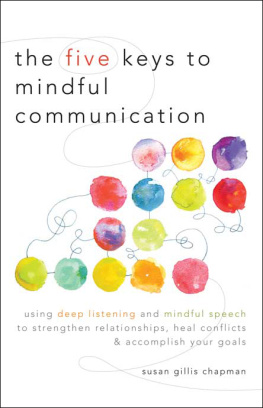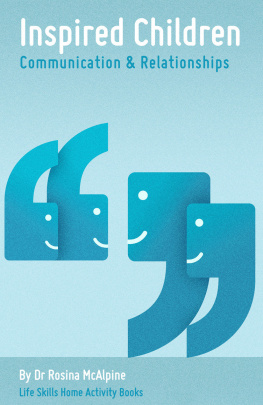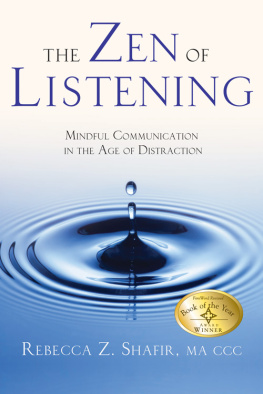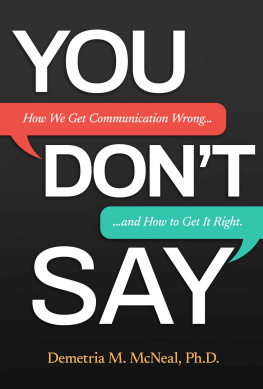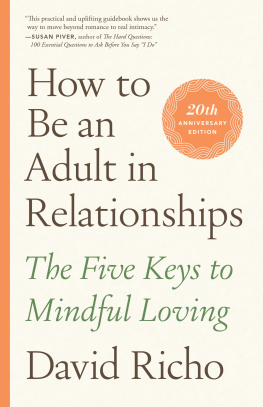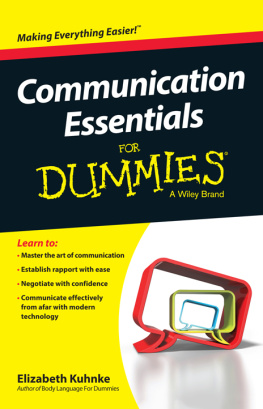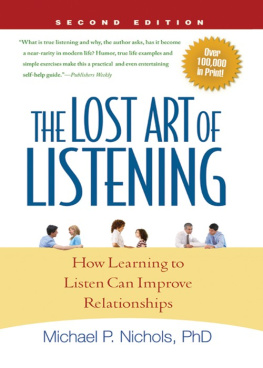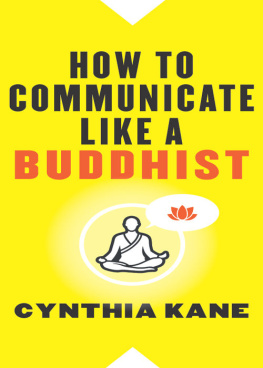ABOUT THE BOOK
Good communiation is essential to any healthy relationship, whether it's between spouses, family members, friends, or co-workers. In this book Susan Chapman, a marriage and family therapist and a longtime meditation teacher, explains how mindfulness can be brought to bear in the way we speak and listen to each other so that we can strengthen our connections and better accomplish our goals. Drawing on Buddhist principles and on her training as a psychotherapist, Chapman explains how the practice of mindfulnesslearning to become fully present in the momentmakes it possible for us to listen more deeply to others and to develop greater clarity and confidence about how to respond.
Chapman highlights five key elements of mindful communication: silence, mirroring, encouraging, discerning, and responding, and she dedicates a chapter of the book to each. Other topics include identifying your communication patterns and habits; uncovering the hidden fears that often sabotage communication; staying open in the midst of difficult conversations so that we can respond wisely and skillfully; and learning how mindful communication can help us to become more truthful, compassionate, and flexible in our relationships.
SUSAN GILLIS CHAPMAN is a marriage and family therapist who has been studying and teaching mindfulness meditation for over thirty years. She is the founder of the Green Light Institute (www.greenzonetalk.com), through which she offers training in mindful communication to couples, therapists, and business people.
Sign up to learn more about our books and receive special offers from Shambhala Publications.

Or visit us online to sign up at shambhala.com/eshambhala.
The Five Keys
to Mindful Communication

Using Deep Listening and Mindful Speech to Strengthen Relationships, Heal Conflicts, and Accomplish Your Goals

Susan Gillis Chapman

| Shambhala Boston & London 2012 |
Shambhala Publications, Inc.
Horticultural Hall
300 Massachusetts Avenue
Boston, Massachusetts 02115
www.shambhala.com
2012 by Susan Gillis Chapman
Cover design by Kathleen Lynch/Black Kat Design
Cover illustration istockphoto
All rights reserved. No part of this book may be reproduced in any form or by any means, electronic or mechanical, including photocopying, recording, or by any information storage and retrieval system, without permission in writing from the publisher.
Library of Congress Cataloging-in-Publication Data
Chapman, Susan Gillis.
The five keys to mindful communication: using deep listening and mindful speech to strengthen relationships, heal conflicts, and accomplish your goals / Susan Gillis Chapman.1st ed.
p. cm.
Includes bibliographical references and index.
eISBN 978-0-8348-2779-0
ISBN 978-1-59030-941-4 (pbk.: alk. paper)
1. Interpersonal communication. 2. Interpersonal conflict. 3. Awareness. I. Title.
BF637.C45C45 2012
153.6dc23
2011035930
This book is dedicated to my parents,
Gwyneth and Jack.
And to my teachers, especially
the mothers of the Sacred Heart
and
the Sakyongs of Shambhala.
I can never repay your kindness.
Contents
This book is the result of the inspiration and input from many people over a twelve year period. Liz Dodd and Pennelope Go-forth and other friends in Juneau helped get the project started after clients and the students in my contemplative psychology classes said, You need to put these ideas into a book! During my nine years at Gampo Abbey, the project was encouraged and supported by Ani Pema Chdrn, who invited me to teach communication classes there, and by regular pep talks from my friends Ani Palmo, Hollis Scott, Les and Louise Collins-St. Marie, and many others. My deepest thanks to you and to all those who patiently transcribed my talks both at the abbey and in Juneau.
Thank you to Richard Reoch, Chuck and Mary Whetsell, Helen Tworkin, Sister Danielle, Karl Brunholtzl, and Tenzin Yongdu for taking the time to read chapters during the early, awkward stages of the manuscript. And special thanks to Emily Sell, Patricia Tate, and Greg Heffron for their invaluable professional help and feedback in editing the preliminary drafts, and additionally to Greg for his contributions and support for Green Light Conversations, our mindful communication workshops in Vancouver. Thanks also to Josie Geller, Lisa Steckler, Paul Belserene, and Daniel Vokey for reading and giving me feedback on the manuscript. Since this project has been carried forward over so many years, Im sure there are several people whom Ive forgotten to mention, so please forgive me and know that your kindness is appreciated. Finally, I cant find the words to express how grateful I am for the tireless, ongoing support, patience, and enthusiastic encouragement given to this project over the years by my family, especially my son, Sheehan Gillis; my sister, Mary Gillis Chiasson; my father, Dr. Jack Gillis; my best friend and dharma sister, Noreen Morris; and above all my wonderful husband, Jerry. Your dedication to this vision and confidence in my work has given me courage, pushed me beyond my comfort zone, and brought this book into a reality. Above all, Im grateful to my teachers, especially Chgyam Trungpa Rinpoche and Sakyong Mipham Rinpoche, whose vision, wisdom, and confidence have guided my work for decades by illuminating the fundamental goodness of our life, of our relationships, and of human society.
I wanted to write this book to share the idea that we can value and learn from all the conversations in our lives, whether they are pleasant, irritating, or seemingly unimportant. This is what practicing mindful communication means to me. Training in this way leads to the realization that human relationships are naturally we-first. It shows us that all the gestures or words we exchange with each other originate from a deep human longing for connection, for acknowledgment and appreciation. We want to be seen, heard, and known for who we are, to have our accomplishments celebrated and our suffering comforted. And, when we look more closely, we find that we have an equal need to see, hear, and know others for who they are, to celebrate their joy and empathize with their pain. This mutual need is a fundamental win-win that underlies our communication and our relationships, analogous to discovering the root system that connects all the trees that appear to be standing alone in a forest. When we create the time and space to feel our inner longing for authenticity, we realize it is inseparable from our capacity to listen and be touched by others. This we-first view about our relationships is one of the central ideas related to the practice of mindful communication in this book.
We-first vision means that we live and communicate in a dynamic, energetic mixing zone that is essentially interdependent. Like the beauty and power of the natural world around us, this mixing zone of human communication is something we take for granted. But when mindlessness takes over, we try to suppress and overrule this way of knowing, planting me-first stakes in the ground and defending our territory. The challenge of mindful communication practice is to see these confused communication habits with sympathy and insight. We notice how they breed a culture of fear and mistrust that keeps our attention focused away from our authentic human nature. We spin story lines based on emotional hunger and aggression. The dividing lines between us become more complicated and we forget that our original need was simply to connect. When the culture of fear spins out of control and things start falling apart, we have an opportunity to get back to basics and ask, What do I really want? We need to recover a feeling of being genuinely connected to others, as many of us do when we learn we are going to die soon. The way to do this is by practicing mindfulness, returning the fullness of our attention to what is happening in the present moment.
Next page
